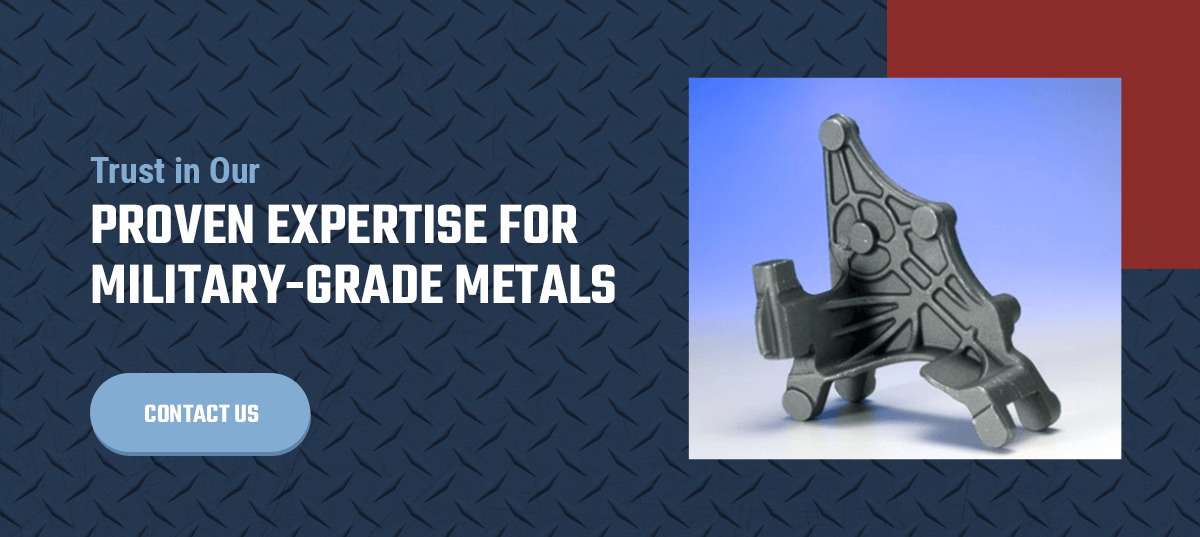The term “military-grade” is frequently used as a selling point, particularly in the manufacturing, construction and aerospace industries. When consumers or businesses hear the military-grade descriptor applied to a material, they likely imagine it as possessing superior strength, durability and resilience. In a sense, that is true, but the reality is a little more complex.
What Does Military-Grade Mean?
Military-grade is a term referring specifically to materials that adhere to the rigorous specifications set forth by the U.S. Department of Defense (DoD). These standards, known as military specifications, verify that the materials will perform reliably under extreme conditions. Common types of military-grade materials include:
- Aluminum alloys: Lightweight and strong, used in aircraft and vehicles
- Titanium alloys: High strength-to-weight ratio and corrosion resistance, used in aerospace and marine applications
- Steel alloys: Available in various grades (like high-strength, low-alloy steel) and often used for structural components
- Nickel alloys: Excellent resistance to heat and corrosion, suitable for use in high-temperature environments
What Is MIL-SPEC?
The meaning of MIL-SPEC is simply that a material meets military specifications per the Defense Standardization Program. These specifications are detailed documents that define performance characteristics, testing procedures and quality standards that a product must meet to be considered suitable for military use. For example, a metal used in a military-grade application must meet specific criteria for tensile strength, corrosion resistance and thermal stability. MIL-SPEC standards are intended to:
- Ensure uniformity and reliability in military equipment.
- Lay out requirements for chemical composition, mechanical properties, testing methods and quality assurance.
- Guide the construction of everything from electronic components to vehicle armor.
What Is Military Standard?
Military standards (MIL-STD) outline the testing methods, procedures and DoD standards that govern the overall material criteria to qualify something as being military-grade. Understanding these terms is important for anyone involved in industries that require military-grade materials, as they ensure that the products they are using or producing meet the necessary performance and safety standards. These standards are broader than those set under MIL-SPEC and may cover areas like design, testing methods and manufacturing practices. Some key goals of MIL-STD include:
- To establish consistent practices across different branches of the military.
- Setting guidelines on safety, interoperability and maintainability.
- Guiding procurement processes to ensure compatibility among different systems.
Why Military-Grade Metals Are Important
Military-grade metals serve applications where failure is unacceptable. They are engineered for extreme performance and are indispensable in defense, aerospace and infrastructure projects. The importance of using military-grade materials lies in their ability to withstand the rigors of combat, extreme weather and other challenging environments.
For example, in the defense industry, these metals are used to manufacture everything from armored vehicles to aircraft components, ensuring they can endure the stresses of combat without failing. In aerospace, military-grade metals are essential for building aircraft that can operate in high-temperature environments and resist corrosion from exposure to harsh elements. Even in civilian applications, military-grade materials can provide an additional layer of safety and reliability, particularly in critical infrastructure projects like bridges, power plants and transportation systems.
Industry Codes for Military-Grade Metals
Military-grade metals are categorized and identified using various industry codes and standards. Here are some of the key codes and designations relevant to various military-grade metals:
Society of Automotive Engineers (SAE) Codes
Examples include of SAE codes are:
- SAE J403: Standard for chemical compositions of carbon steels
- SAE J2340: Specification for high-strength, low-alloy steel sheet and strip metal for automotive applications
- SAE AMS (Aerospace Material Specifications): A series of specifications covering various aerospace materials, including metals suitable for military use
MIL-SPEC/MIL-STD Codes
Some examples of MIL-SPEC and MIL-STD codes include:
- MIL-DTL-83400: Specification for aluminum alloys used in military applications
- MIL-A-46100: Specification for ballistic armor plate used in military vehicles
- MIL-S-5002: Specification for corrosion-resistant steel used in military applications
American Society for Testing and Materials (ASTM) Standards
The following are a few popular ASTM codes:
- ASTM A36: Standard specification for carbon structural steel
- ASTM A572: Standard specification for high-strength, low-alloy columbium-vanadium structural steel
- ASTM B265: Standard specification for titanium and titanium alloy mill products
- ASTM B686/B686M: Standard specification for aluminum-alloy castings, high-strength
- ASTM B26/B26M: Standard specification for aluminum-alloy sand castings
- ASTM B30: Standard specification for copper-base alloys in ingot and other forms, including nuggets, granules, pellets or shot for remelting
American Iron and Steel Institute (AISI) Codes
Common AISI codes include:
- AISI 4130: Alloy steel with chromium and molybdenum, commonly used in military applications
- AISI 5160: High-carbon spring steel often purposed for military vehicle components
International Organization for Standardization (ISO) Codes
ISO codes often applied in the material production sector include:
- ISO 9001: Quality management systems standard that can be applied to manufacturers of military-grade metals
- ISO 14001: Environmental management systems standard relevant to producing MIL-SPEC materials
Trust in Our Proven Expertise for Military-Grade Metals
Choosing a trusted partner like Warner Brothers Foundry Company ensures that your projects benefit from materials that exceed the stringent MIL-SPEC requirements. Focusing on quality, compliance and reliability, we are the go-to source for military-grade castings that deliver exceptional performance in the toughest conditions. Contact us today to learn more about how we can meet your military-grade metal needs.


